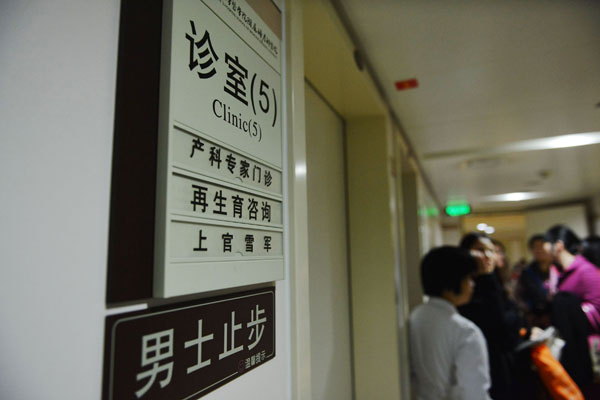

 |
|
A special consultation unit designed to help newly eligible couples to have a healthy second child opens in the Obstetrics & Gynecology Hospital affiliated with the Zhejiang University. Long Wei / for China Daily |
The government's relaxation of its birth rule to allow more couples to have a second baby provided an instant stimulus to maternity-care and fertility centers on the Chinese mainland.
Preparations for changes that will come with the new policy — which authorities expect to be implemented early next year — are now under way.
Late last month, the Obstetrics & Gynecology Hospital affiliated with the Zhejiang University took the national lead by opening a special consultation unit designed to help newly eligible couples have a healthy second child.
Hospital authorities said the unit would be open once a week and that it would be staffed by veteran doctors aiming to help women have smooth pregnancies.
Meanwhile, in Beijing, veteran gynecology and obstetrics specialists expressed concerns about what they see as a possible gap between the rising demand for maternity services and the current capacity to deliver them. The system is already strained, they say.
Wang Aiming, director of gynecology and obstetrics at the Navy General Hospital in Beijing, said the policy will put more pressure on her department if more women choose to give birth. The number of problem cases will also rise, she said.
“Right now we are running at our full capacity,” she said.
Last year about 2,500 children were born in the hospital, and her department is already considering shortening the time a woman can stay in the delivery ward.
Since the government announced the new policy allowing only-child couples to have two children, many couples with a new baby in mind have come to Wang’s department for assistance. Wang said she believes they will keep coming.
“They include women who have had miscarriages as a result of previous abortions, and those who cannot get pregnant easily because of their age,” she said.
Liu Ping, deputy director of the fertility center of Peking University Third Hospital, a department that helps people overcome reproductive difficulties, also expected the number of those seeking help to rise.
“The first generation of children born under the one-child policy are now in their 30s. Women of 35 or above will feel more urgency about having another child and more of them will come to consult us or seek medical assistance,” she said.
Most of the people who come to the center for medical assistance are trying to have their first child, Liu said, and those who want medical assistance for a second child will need to show papers issued by family planning authorities to prove they are eligible.